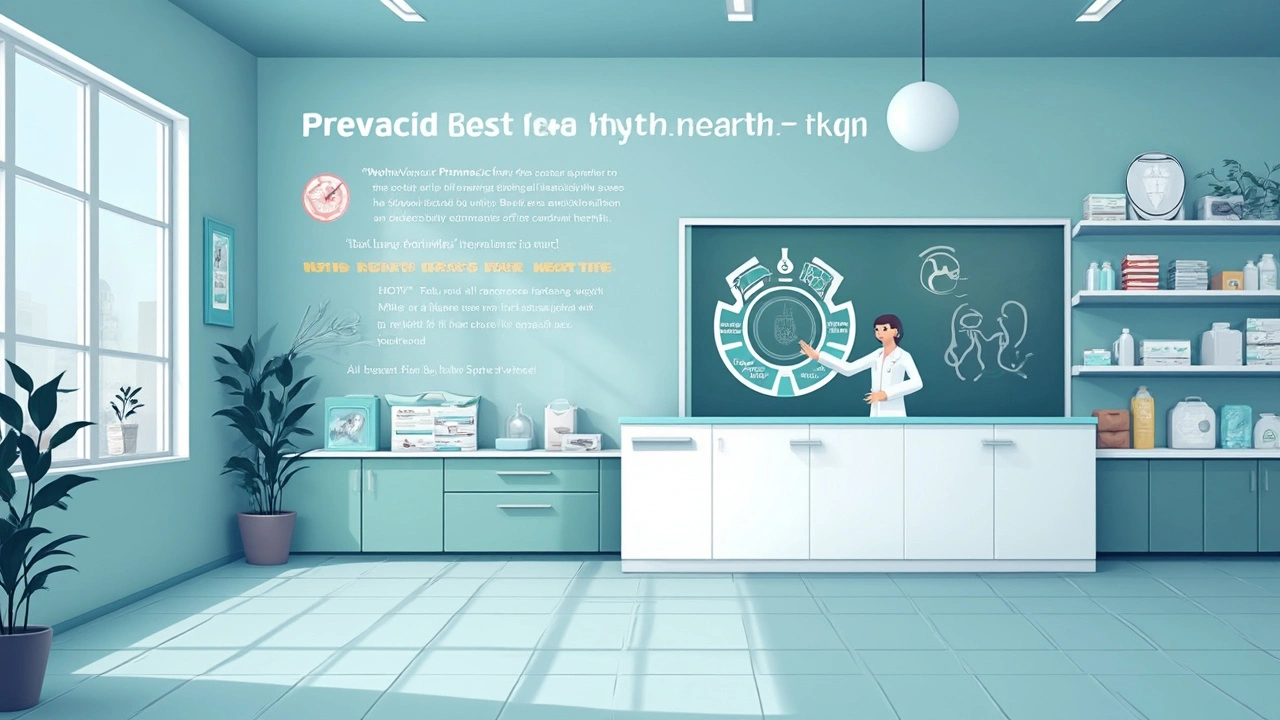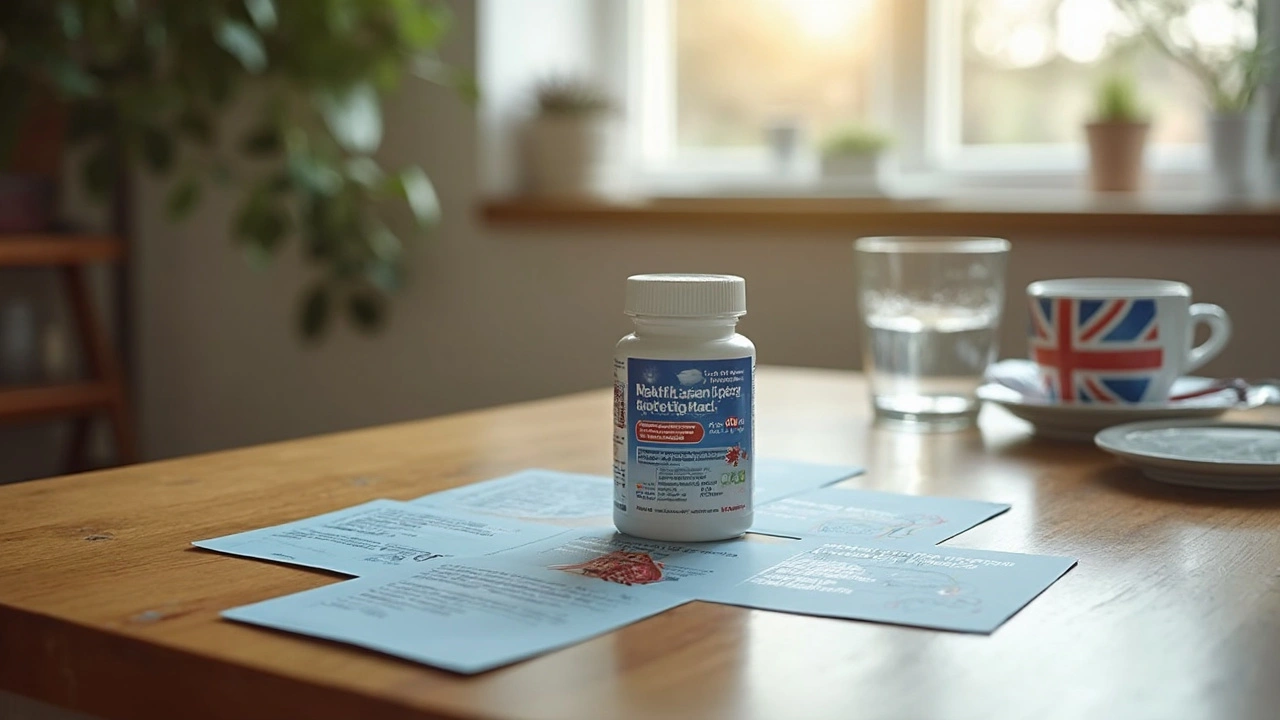You ever feel like your chest’s on fire after pizza, or wake up with that gross acid taste creeping up your throat? Acid reflux and heartburn are the household monsters barely anyone talks about unless they’re reaching for a bottle of something. Meet Prevacid—the tiny capsule that makes big promises. Advertised as a rescue for your burning belly, this drug isn’t just thrown around by doctors for fun. In fact, Prevacid, known generically as lansoprazole, racks up millions of prescriptions each year. Folks swear by it, yet most only have a fuzzy idea of what’s really happening in their stomach. Let’s get behind the scenes and see what Prevacid actually does, when to use it, and the pitfalls nobody mentions in those chipper commercials.
What Is Prevacid and How Does It Work?
Prevacid isn’t just another antacid you pop after a big meal at your favorite greasy spoon. It belongs in a different league—known as proton pump inhibitors (PPIs). This class of drugs is like the on/off switch for acid in your gut. So how’s it different from old-school remedies? Antacids like Tums zap the acid that’s already in your stomach, giving quick relief. Prevacid, though, actually dials down how much acid your body makes in the first place. It targets these special proteins in the stomach lining called proton pumps. Think of them as tiny acid pumps that go wild after you eat. By blocking these, Prevacid brings your stomach’s acid production to a crawl. Don’t expect instant magic; it usually takes a day or so to really kick in. That’s why if you have major heartburn right now, you’ll still need something faster while Prevacid builds up.
This drug first hit U.S. pharmacies back in 1995, and it’s now as familiar a name as Tylenol for folks dealing with heartburn or gastroesophageal reflux disease (GERD). Doctors also prescribe it for ulcers, especially those caused by H. pylori infection, and a few weirdly specific conditions like Zollinger-Ellison syndrome where the stomach cranks out acid on turbo thanks to rare tumors. Here’s an eye-popping stat—about 15 million people in America alone swallow PPIs at any given time, according to a study published in JAMA in 2023. Yet, only some of them actually need long-term use. For most, Prevacid is a short run while their stomach sorts itself out.
When Is Prevacid the Right Choice?
Not every bellyache needs a pill, so when should you reach for Prevacid? The FDA green-lights it mainly for frequent heartburn (that’s two or more times a week), GERD, and healing ulcers. Doctors sometimes hand it out for cases of non-ulcer dyspepsia (the fancy term for stubborn indigestion) when everything else fails. If you’re trying to decide whether you should start, here’s a practical test: if basic lifestyle tweaks—like eating slower, skipping the midnight tacos, and cutting down on coffee—don’t help after a few weeks, it could be time for stronger stuff.
People using NSAIDs a lot, like ibuprofen or naproxen, might get a prescription for Prevacid to protect their stomach lining. Those anti-inflammatories are notorious for causing ulcers. And if you’ve been scoped and diagnosed with H. pylori? Your doctor may set you up with Prevacid, plus antibiotics, to tackle the infection and keep the stomach safe as it heals.
Prevacid can work wonders in the right situation, but it’s not always the cure-all people hope for. Sure, it tackles symptoms, but it can’t fix habits or prevent all problems linked to too much acid. Here’s the catch: if you’re not having serious acid reflux, there’s zero benefit to taking it “just in case.” Some experts warn that folks sometimes use PPIs longer than they should, mostly out of habit, which can stir up trouble later on. So if you’re asking yourself, 'Should I be using Prevacid long-term?'—it’s worth a deeper chat with a doctor, not just a Google panic session at 2 a.m.

How to Use Prevacid For Best Results
Scoring heartburn relief isn’t about just swallowing the pill and hoping for the best. Let’s talk timing and hacks for best results. For most adults, the starting dose is 15 to 30 mg once daily before breakfast. Why before eating? Your stomach’s acid pumps are revving up for food—they’re more likely to get sniped by Prevacid right then. Don’t chew or crush those capsules. The drug’s coated for a reason; chewing messes with how it gets absorbed. If you’re using the dissolvable tablet, let it fully dissolve on your tongue without water first—that’s not just marketing, it really matters for the drug’s job.
If you’re doing a stint for heartburn, the standard run is 14 days. No improvement? That’s your cue to get checked out—don’t just double the dose or stretch it for weeks on end. And if you forget a dose, just skip and jump back in the next day. Don’t try to play catch-up or you’ll throw off your stomach. It goes without saying, but mixing Prevacid with certain meds can be a bad move. It can mess with how some drugs—like warfarin, digoxin, or HIV meds—work in your body. So if you’re stacking prescriptions, talk it out with your doctor or pharmacist first.
Those using Prevacid for ulcers and H. pylori usually have to take antibiotics alongside it, and sometimes do two doses a day. That’s a bit more intense, but research backs it up—healing rates jump by over 80% compared to antibiotics alone, according to a 2022 clinical review in The Lancet. Table below shows the typical treatment plans.
| Condition | Typical Prevacid Dose | Treatment Duration |
|---|---|---|
| Frequent Heartburn | 15mg/day | 14 days |
| GERD (Adults) | 15-30mg/day | 4-8 weeks |
| Ulcer + H. pylori | 30mg 2x/day (with antibiotics) | 10-14 days |
Don’t forget, lifestyle still counts. Keep your last meal small and early. Lay off late-night snacking, heavy grease, or alcohol—these can drown out any good Prevacid does. Raise your bedhead a few inches if nighttime heartburn’s your curse. Even with this pill, bad habits make a comeback easy.
What Side Effects and Risks Should You Watch For?
No one likes to talk about downsides, but Prevacid isn’t totally innocent. The most common side effects are mild, like headache, diarrhea, belly pain, nausea, or constipation. But here’s where it gets interesting: using any PPI for months at a time can set you up for bigger issues. Your stomach acid is there for a reason—it kills nasty germs and helps absorb certain vitamins and minerals. When it’s dialed down for too long, you can end up low on vitamins B12, calcium, magnesium, and even iron. That, in turn, might trigger fatigue, muscle cramps, or make bones weaker over years. Some research even links long-term use with a higher risk of bone fractures, especially for people over 50.
More rare—but scary—side effects exist too. There’ve been reports of gut infections, like Clostridioides difficile, because less acid means bad bacteria can slip past your natural security system. A few studies—notably a big one from Harvard in 2022—hinted at a small uptick in chronic kidney disease and even dementia risk in people using PPIs for years, but it’s hotly debated and might be related to other health issues at play. Short-term users are usually in the clear. Still, any new chest pain, bad abdominal pain, black stools, or bizarre allergic reactions are red flags: see a doctor ASAP.
Your meds list matters too. PPIs can lower the absorption of antifungals and HIV meds, and raise blood levels of drugs like methotrexate. For older adults or those on blood thinners, that’s even more reason to check with a pharmacist every few months if Prevacid’s still on your chart.

Practical Tips, Myths, and When to Rethink Your Rx
You’re not stuck popping Prevacid forever. Sometimes, it’s easy to get addicted to the convenience—no need to change what you eat or bother about extra pounds, just let the pill work. But if you overuse it, stopping cold turkey might bring on 'rebound' acid production—your stomach goes into overdrive. If you’re thinking about stopping, talk to your doctor about tapering. They might drop you down to every other day for a bit, or swap you over to an H2 blocker like famotidine as a bridge.
Let’s bust a few myths. Prevacid is NOT a fix for every stomach pain. It won’t help with bloating, gas, or IBS unless those symptoms are tied to acid. And no, it doesn’t speed up digestion—if anything, less acid means breaking food down could slow a little. If you’re mixing it with antacids, take the antacid at a different time of day—otherwise, you’re just wasting both meds. Plant-based eaters or folks with known nutrient issues might want to double-check they’re getting enough B12 and calcium, especially after a few months on Prevacid.
If you’re pregnant, Prevacid is considered safe enough in most cases, but always double-check first, especially early in pregnancy. There’s no magic about buying the OTC version (Prevacid 24HR) or the prescription kind—it’s the same drug, just different dosing. Insurance might cover one over the other, so use what fits your bill. And don’t waste money doubling up with another PPI 'for good luck.' Two won’t work better than one.
The bottom line? Prevacid does what it promises when used right, and for most people it’s a life-changer. Like any tool, it’s best when used smart—and not as an excuse to dodge healthier habits. Got symptoms out of nowhere, or burning that won't quit even on Prevacid? Don’t play doctor—new pain or unexplained changes always deserve a real checkup. Only you and your doctor can decide if it’s time to quit, keep going, or switch up your plan. Stay sharp, stay curious, and don’t take your gut for granted. Sometimes your body’s trying to tell you something real—you just have to listen.





Casey Crowell
May 31, 2025 AT 08:39Prevacid saved my life after I started eating like a raccoon at a buffet. But honestly? I took it for 2 years straight and didn’t realize I was basically starving my body of magnesium until my calves cramped like I was in a horror movie. 🤯 Now I take it only when I’m dumb enough to eat tacos at midnight. Still love it, but don’t be me.
Shanna Talley
June 1, 2025 AT 03:36So many people treat PPIs like candy but your stomach isn’t a broken faucet you can just turn off forever. I’ve helped friends taper off and they’re shocked how much better they feel without it-once the rebound passes. You don’t need to suffer, but you also don’t need to be dependent. Listen to your body, not the ad.
Gina Damiano
June 1, 2025 AT 15:24I’ve been on this for 5 years and I’m fine. People are drama queens about side effects. My doctor says I’m fine. End of story. Why are you all so scared of a little acid reduction? It’s not like I’m taking steroids.
Emily Duke
June 2, 2025 AT 11:41Y’all are acting like Prevacid is crack. It’s a pill. A. Pill. You take it for 14 days. You don’t take it because you’re lazy and eat pizza every night. You don’t take it because you’re too ‘busy’ to sleep on a wedge pillow. You don’t take it because you think it’s ‘safe’ because it’s OTC. It’s NOT. You’re all just… lazy. And now your bones are brittle. 😭
Stacey Whitaker
June 3, 2025 AT 18:48Living in the US and seeing people treat PPIs like gum is wild. In Australia, doctors make you jump through hoops before prescribing. We have this thing called ‘lifestyle first.’ Also, no one here calls it ‘Prevacid’-it’s lansoprazole. Just saying. 🇦🇺
Kayleigh Walton
June 4, 2025 AT 07:53If you’re considering stopping Prevacid, don’t just quit cold turkey. Talk to your provider about tapering-maybe switch to an H2 blocker like famotidine for a few weeks. Your stomach needs time to recalibrate. And if you’re taking it for more than 3 months without a clear diagnosis? That’s a red flag. You deserve better than a pill that masks the problem.
Stephen Tolero
June 5, 2025 AT 21:58According to the 2023 JAMA study cited, approximately 15 million Americans use PPIs concurrently. Of these, an estimated 70% exceed recommended durations. This suggests a significant gap between clinical guidelines and real-world usage. Further research is warranted to assess long-term public health implications.
Brooklyn Andrews
June 7, 2025 AT 20:53I took this for 6 months after my gastric bypass and it was fine. But then I got weird numbness in my fingers. Turns out my B12 was in the toilet. I didn’t even know acid helped absorb that. Lesson learned. Now I get bloodwork every 6 months. Don’t be dumb like me.
Joanne Haselden
June 9, 2025 AT 03:38From a clinical gastroenterology standpoint, the phenomenon of rebound acid hypersecretion following PPI discontinuation is well-documented in the literature. The mechanism involves upregulation of H+/K+ ATPase expression and parietal cell hypertrophy. Clinically, this necessitates structured tapering protocols rather than abrupt cessation to avoid iatrogenic symptom exacerbation.
Vatsal Nathwani
June 9, 2025 AT 10:03Why are you all stressing? Just take Tums. It’s cheaper. You eat too much. You drink too much. You sleep too late. Stop blaming the pill. The pill isn’t the problem. You are.
Saloni Khobragade
June 10, 2025 AT 06:47Prevacid is evil!! It makes you weak and you lose your bones and you get cancer!! I read it on a forum!! My aunt took it and she died!! You should all be ashamed!!
Sean Nhung
June 10, 2025 AT 14:39My dad’s been on this since 2018. He just stopped last year and now he eats curry like it’s nothing. No more burning. No more pills. Just better habits. I’m gonna try it too. 🙌